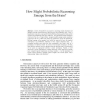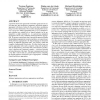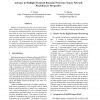17 search results - page 1 / 4 » How Might Probabilistic Reasoning Emerge from the Brain |
AGI
2008
13 years 6 months ago
2008
: A series of hypotheses is proposed, connecting neural structures and dynamics with the formal structures and processes of probabilistic logic. First, a hypothetical connection is...
BSN
2006
IEEE
13 years 10 months ago
2006
IEEE
Ubiquitous computing has established a vision of computation where computers are so deeply integrated into our lives that they become both invisible and everywhere. In order to ha...
ATAL
2007
Springer
13 years 10 months ago
2007
Springer
Agents that must reach agreements with other agents need to reason about how their preferences, judgments, and beliefs might be aggregated with those of others by the social choic...
ETFA
2006
IEEE
13 years 10 months ago
2006
IEEE
Multiplysectioned Bayesian networks provide a probabilistic framework for reasoning about uncertain domains in cooperative multiagent systems. Several advances have been made in r...
NIPS
2004
13 years 5 months ago
2004
Areas of the brain involved in various forms of memory exhibit patterns of neural activity quite unlike those in canonical computational models. We show how to use well-founded Ba...



